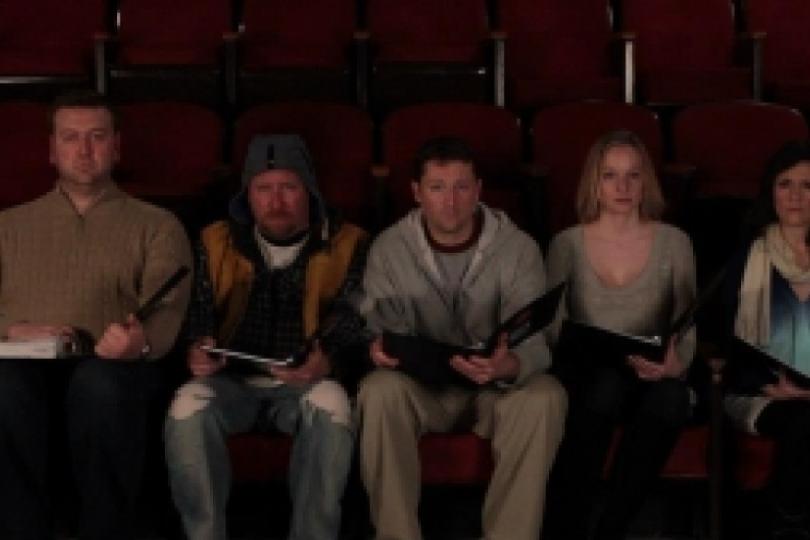The symbiosis of stage and screen
Editorial

Among the 16 Dramatic Competition titles recently announced for the 2014 Sundance Film Festival, two were independent features shot in Minnesota. While it’s great to see locally-shot films make it to the big show, it’s unfortunate that neither of these films is truly local. Written and directed by out-of-towners and starring almost exclusively non-local actors, Dear White People and Kumiko, the Treasure Hunter are two more examples of films just passing through.
While transient productions like these are great for the economy and for the local talent fortunate enough to snag a job, it’s baffling that a nationally-renowned arts community like ours has yet to produce an independent film that’s received national attention. It’s a tough racket (Sundance received more than 4,000 feature film submissions this year from which they chose their 117 film program), but still… nothing?
Music, poetry, playwriting, acting, fine arts, fashion: the Twin Cities have produced nationally prominent figures in practically every medium but film. Even local filmmakers who have made good have made their names (and their breakout films) after packing their bags and moving elsewhere. Speaking strictly in terms of shoestring-budgeted regional film, where is our Clerks (New Jersey), Slacker (Texas), Pi (New York), George Washington (North Carolina) or Beasts of the Southern Wild (Louisiana)?
There’s no simple answer to this, but there is a unique secret weapon for local filmmakers which has gone conspicuously underused: the Twin Cities theater community.
Locations, special effects and equipment all cost money, which is generally in short supply on an indie production. But history has shown that a good director with a solid script can put a decent actor – not even a great actor; Ryan Reynolds will do – in a box for an hour and a half and have a respectable movie on their hands. Put simply, nothing legitimizes a film more effectively than solid, professional acting.
Minnesota filmmakers live and work next door to one of the most vital theater scenes in the country. In addition to being, on the whole, remarkably talented, Minnesota theater actors tend to be intelligent, hardworking, ambitious, generous with their time, enthusiastic and responsible. If they believe in a project, they also come reasonably cheap. They are, in other words, an independent filmmaker’s dream. Yet local films are often marred by poor performances by non-actors while stage actors remain largely inexperienced and even uncomfortable with on-camera work.
Why don’t more indie films take advantage of this natural resource and, conversely, why aren’t more theater actors making themselves available to indie films? Many filmmakers feel “stage acting” doesn’t translate to screen – performances are too big, playing to the cheap seats that don’t exist in film. Meanwhile, actors have often done one or two independent film projects and been disappointed by both the experience and the end result.
Neither of these points of view is without merit and there have been plenty of unsuccessful screen performances by talented stage actors which have left both actor and filmmaker with a bitter taste in their mouth. That said, when well-utilized, theater actors can be a magic bullet for an independent film. What follows are tips for both filmmakers and actors based on my experiences on both sides of the camera.
Five Tips for Independent Filmmakers Working With Stage Actors:
1. Don’t Be Afraid Of Theater Actors
This is a good place to start. I’ve spoken to filmmakers who actively avoid casting theater actors because they fear big, theatrical performances that won’t translate to film. While it’s true that stage acting and acting for the camera are different beasts, a good stage actor has a whole utility belt of tools that have been assembled through years of playing different roles in different spaces for different directors. Even if their initial take on a role is off the mark, they’ve got the skills to adjust their performance to the specifications of the filmmaker.
2. Provide Scripts In Advance
Like really in advance. Stage actors are necessarily brilliant at memorization. Help them help you.
3. If At All Possible, Rehearse
As with the previous tip, this is a great way to tap into the skill sets of your stage actors. With a play, actors have weeks to discover their performance organically through rehearsal and guidance. The result is a confident, professional, consistent performance. If you can ape the theatrical rehearsal process to any extent, you’re playing into your actors’ strengths and are increasing the chances that the talent you’ve seen on stage will be in evidence in front of the camera. Added bonus: rehearsals solidify the actor’s facility with the arc of the character through the script, making it easier to drop into any moment you may need them to access as you (likely) shoot out of sequence.
4. Listen To Your Actors
Actors tend to have great instincts and enjoy experimenting with different options. Particularly as they become more familiar with their character, keep the lines of communication open. You may discover new options to explore or reveal moments that read well on the page but don’t ring true on screen.
5. Direct Your Actors
Here’s the big one. It seems obvious, as it’s right there in the job title, but you need to direct your actors. On this front, experienced stage actors’ professionalism can actually work against them – on an indie film set where it feels like there are twenty fires to put out at any given time, it’s easy to neglect an actor who has their lines memorized and can hit their marks. But that technical competency is only the beginning of a performance. Actors rely on a director to steer them into the world of the film. How does their character interact with other characters? How is their performance changing (or remaining consistent) throughout the film? How does this scene need to play in relation to the scenes before and after it? As the director, you’re the person with the entire film in your head. You’re the only one who knows how all the pieces are supposed to fit together. Actors rely on you to guide and shape their performance so that the completed film shows their talent in its best light. You’re responsible for about 50% of the final performance. Don’t leave your actors hanging.
Five Tips for Stage Actors Working With Independent Filmmakers:
1. Come Prepared
Assuming your director has done their part and provided you with your pages in advance (and, if you’re lucky, even a few rehearsals), arrive at the set on time and ready to roll. Have your lines solid and be clear on what it is you want to do. Odds are you’re not going to have a ton of time to grab the footage you need to get. There are going to be problems with sound or with lighting or with the camera. Don’t be yet another variable. If you have the luxury of five or six takes of a shot, you want to be able to use each of those takes to nail and vary your performance, not just to get your lines right.
2. Ask Questions
Communicate with your director and trust your gut. If there’s something you don’t understand or something you feel simply doesn’t work, raise the issue. Ideally, most of this can be talked out before you’re actually on the set, but whenever these concerns arise, bring them to the director’s attention. Don’t waste time guessing at what you’re supposed to do.
3. Choose Wisely, Then Trust Your Director
Like theatrical productions, not all indie film projects are equally worthy of your time. Most stage actors are familiar with the experience of considering a role in a show that feels like it might be a mistake. After a number of years making those decisions rightly and wrongly, those instincts get honed, but in the less familiar waters of the film world, it can be tough to judge. Before signing on to a project, do your homework: Do you like the script? Do you like the production team (director/producer/other cast members/etc.)? If you can, seek out other work they’ve produced – are they projects you’d be proud to have been a part of? Do you know any actors who have worked with them in the past who’ll vouch for them? The more of these questions you can answer before signing on to a production, the more likely it’ll end up being a positive experience. Then, once you’ve made your decision, dive in with no reservations and hold nothing back. The camera hates a hesitant performance.
4. Play With Choices
Unlike theater, where you essentially make a choice and stick with it, film allows for a spectrum of possibilities. The final film will be assembled by the director and editor weeks or months later and the more options they have to work with, the better the chance they can find the magic in a scene. Come ready with your favorite take on the material and make sure it gets a couple solid renditions. Once that’s done, work with the director to explore other options. Is the line funnier delivered straight? Is the scene more effective if you don’t make eye contact? Due to time, budget or logistical constraints, you often won’t have the opportunity to deliver anything but your “A” take, but if the shoot allows for it, consider other, more unexpected, ways to go.
5. Roll With It
Independent film is a living organism, constantly shifting and changing due to a dozen different factors. You were going to be playing a librarian, but the location fell through and now you’re a corporate executive. You were supposed to have three scenes establishing your relationship with your estranged daughter, now there’s only time to grab one. The heart wrenching deathbed conversation you prepped all week got scrapped because the actor playing your dying father got a Target industrial. Now it’s a monologue. Roll with the changes as best you can and be alive to the possibilities of the situation. Your favorite moments in the film may well end up being things that weren’t supposed to happen.




